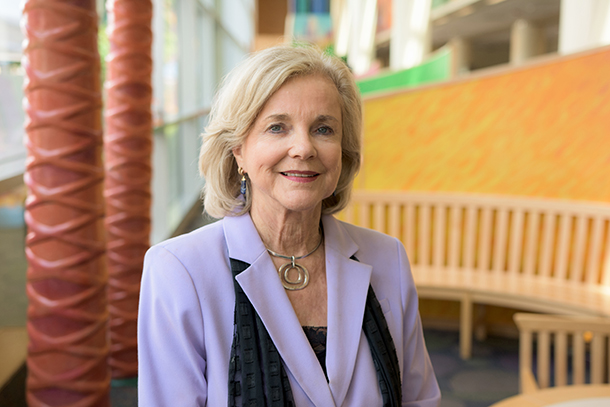In between training future healers as a professor of clinical pediatrics at the Keck School of Medicine of USC, as well as seeing patients and directing treatment as chief psychologist of general pediatrics at Children’s Hospital Los Angeles, Marie Kanne Poulsen, PhD, applies her experience to help shape public policies designed to protect and help the youngest and most vulnerable members of society.
As chairperson of California’s Interagency Coordinating Council on Early Intervention (ICC), Poulsen leads a diverse, governor-appointed team that advises the Department of Developmental Services to oversee $350 million in state and federal funds dedicated to the Early Start program that serves infants and toddlers from birth to 3 years old identified as having delays, disabilities or biomedical risks of disability, such as low birth weight, prenatal drug exposure or other perinatal insults.
Early detection and intervention of developmental problems is key, Poulsen said. And the correct approach requires not only assisting children with delays with their struggles, but fostering their potential, just like any other child.
“We need to serve them as children with promise,” Poulsen said. “Our job is to identify their strengths, as well as their vulnerabilities.”
It’s vital to work with parents and guardians, as well as the children themselves, she said.
“Most publicly funded services in California are either for adults or for children,” she said. “The wonderful thing about this program is it requires an individualized family service plan.”
The state has a robust network to help children with delays and disabilities, along with their caregivers, Poulsen said. The ICC’s goal is coordinating the complex array of available services to make sure families in need are connected with the proper services, including physical, occupational and language therapies, as well as the services of developmental specialists.
“The nice thing is, most of these services can be provided in the home,” she added.
Considering the wide array of insurers, health care providers, specialists and organizations involved in caring for children with special needs, knowing what resources are available and where to get them can be a daunting task for parents, Poulsen said. Even health care providers are not always up to speed on how to access the appropriate programs and services.
“Our challenge is, we have a fabulous program, but there are inequities in the access to services for children,” she said.
The disconnect can be especially pronounced for parents already dealing with poverty, homelessness, social isolation, language barriers, addiction or other socio-economic difficulties.
“Now, because of what’s going on at the border, there’s fear of deportation,” Poulsen said. “So moms are scared to bring their kids to the doctor because they don’t know if they’re going to be going home. It’s added stress to the families and it’s kept them from access to services — and that’s serious.”
Although she is an administrator at CHLA, Poulsen makes it a point to continue seeing patients. And the experience is invaluable to her work with the ICC.
“That’s what I love doing,” she said. “I don’t want to talk about it academically, I want to talk about the lives of the families.”
Poulsen has served on the ICC for nearly 25 years and was named chairperson in 2016 by Gov. Jerry Brown.
Poulsen said she often discusses the very same issues in CHLA’s Leadership Training Program.
“The responsibility of seeing that all infants and toddlers with delays and disabilities reach their potential is formidable,” she said. “Not all eligible children in California have access to our comprehensive family service system that utilizes a family-centered approach and interagency collaboration. That is a shame, but we keep lighting the candles rather than cursing the darkness.”
— Brian Day


